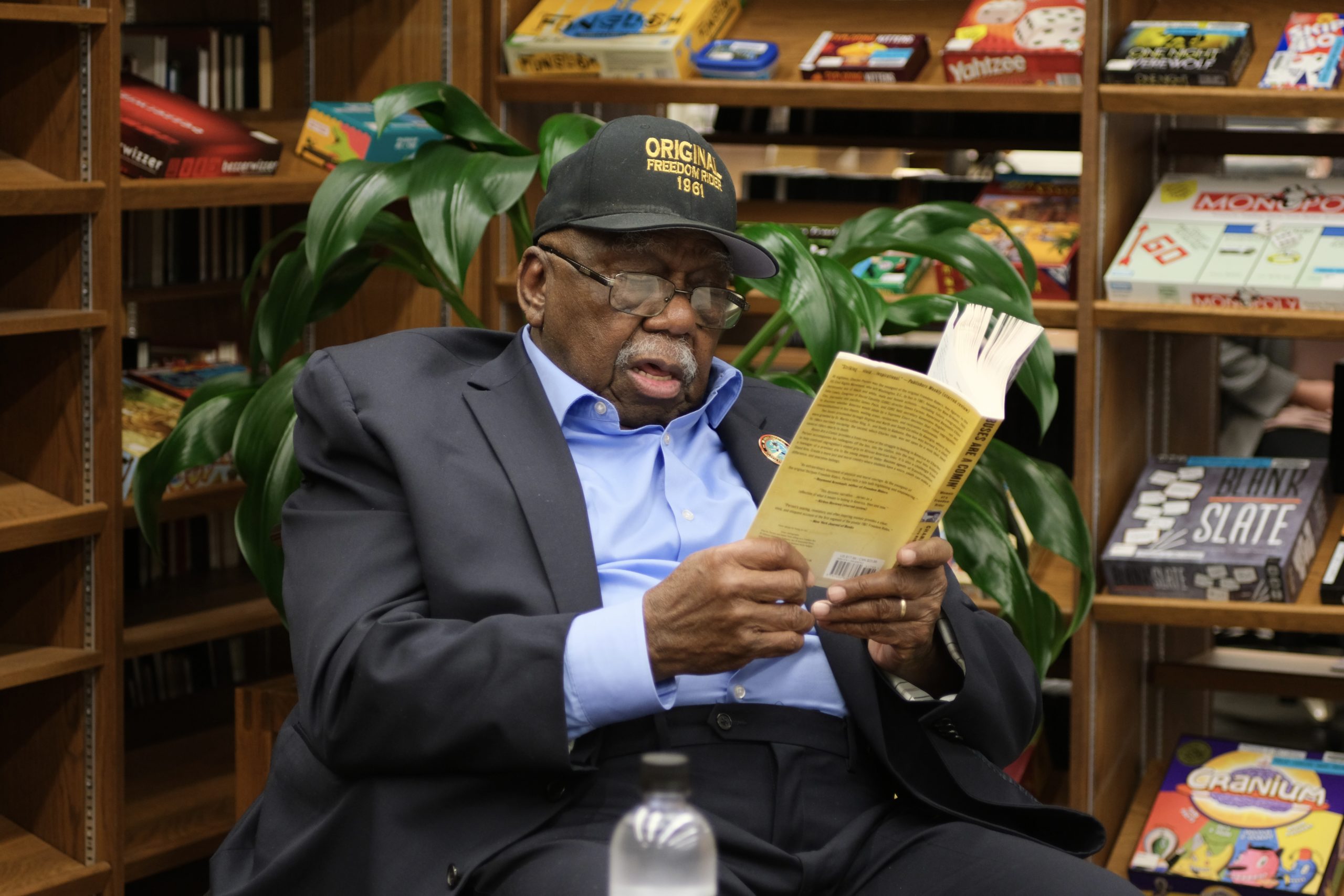![]()
For a couple days, John Brown University hosted on campus one of the two last living Freedom Riders, Charles Person. On Monday, Feb. 21, Person spoke in a Q&A held in the JBU library for the student-led book club that began reading his memoir, “Buses Are a Comin’,” starting on Martin Luther King Jr. Day. The following day, Feb. 22, Person spoke during the Chapel service with Trisha Posey, professor of history and director of the Honors Scholars Program, and student Zipporah Jones.
Chapel on Tuesday was busting at the seams with students and guests from St. James Missionary Baptist Church from Fayetteville, with many spilling onto the floor and along the walls. After the normal worship service, Jones advanced to the center of the stage and began singing “Buses Are a Comin’” along with the worship team in a beautiful, heart moving melody. Their singing was accompanied by a silent, short video about the Freedom Riders movement, showcasing real footage, pictures and text with context to the situation back in 1961. Afterwards, Posey introduced Person, who participated in the ride at age 18, served in Vietnam and was in the U.S. Marines for 20 years.
Jones and Posey alternately asked Person questions about his experience, how he persevered, how he decided to become involved, details about the movement and much more.
Jones, freshman family and human services major, shared her experience interview Mr. Person. “Getting to spend time with Mr. Person and interviewing him in chapel was such an honor and a blessing,” she said. “Words cannot express how grateful I am for everything Mr. Person has done for our country. He risked everything so that people like me could be treated equally in this country.”
Person emphasized the nonviolence in the Freedom Riders movement and the power of truly loving one another. While maintaining nonviolence is difficult when someone is beating you, Person explained how, by not fighting back and just protecting the women and holding in the fetal position when on the ground, aggressors would become frustrated. They can’t brag about winning a fight in which the opponent doesn’t fight back.
Amidst all the Jim Crow laws and racism of the 60s, Person told how protestors could still recognize that hatred towards bigots was not the answer. He said, “[The] principle of nonviolence is love.” Person pointed out that “every movement that took arms was unsuccessful.” He listed the Black Panther Party as unsuccessful, but their little Freedom Ride changed segregation at bus stops in the South.
Another notable part of the Freedom Riders movement was the fact it was 50/50 Black and white protestors. Person described the group as young and old, Black and white and about one fourth of the participants were women. Protestors had a dress code, in which men would wear nice shirts and a tie, and women would wear their Sunday best. Even when the movement changed from riding buses to filling the jails and people came from all across the country, those numbers stayed the same: 50/50 Black and white.
Person also explained that, when he signed up for the Freedom Ride, he and his fellow protestors weren’t expecting the level of violence they would encounter. Person expected ketchup to be dumped on him or someone to burn out a cigarette on him but not to burn their bus, to relentlessly beat them, or to name call with slurs like “gorilla” among others. Person wondered, why do the police hate me? A sentiment still shared today among African Americans.
When asked why Person joined the movement, he said old people can see things that are wrong and assume things will get better in time, meanwhile young people see something that’s wrong and know nothing’s going to change unless they do something about it. “Change begins with you. Change begins with young people.”
During the book club Q&A, students engaged with Person by asking a multitude of questions. Someone asked what Martin Luther King Jr. was like, and Person responded with a story of passing by King in a pool hall. King loved pool, and more importantly he “got people goin’.” King had warned the Riders how bad Alabama was, and he was right. The Riders had to fly out of Alabama because the people there would not allow the Riders to go anywhere.
Person also spoke about his motivation behind joining the Freedom Riders. With the mindset, “Well, it can’t get any worse than this,” Person used this hopelessness to push him towards making a difference. As the years roll by and racism persists as a hot issue in the U.S., Person said he is comforted by the commonality between all of mankind and the present good. He is also encouraged by continual prayer, devotions and song.
Something they did a lot as Freedom Riders was sing. As part of the closing of chapel on Tuesday, Person began singing a reprise of “Buses Are a Comin’,” the song the Riders created as part of their experience, and a song they sang frequently in the jail. After he paused, some students began singing softly, soon prompting everyone to sing the chorus.
“Buses are a comin’ oh yes,
Buses are a comin’, oh yes,
Buses are a comin’, buses are a comin’, buses are a comin’
Oh yes.
Better get ya ready, oh yes.”
Photo courtesy of JBU Marketing and Communication





